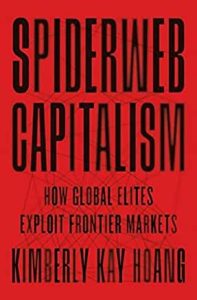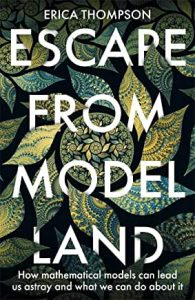A 2016 book that was an eye-opener for me was Brooke Harrington’s Capital Without Borders: Wealth Managers and the One Percent. A sociologist, she had trained as a private client wealth manager and worked among/for the global elite – the Ultra High Net Worth Individuals (UHNWIs). The rich really are different…. and among her striking findings was their deep-seated belief they have that the money is theirs, or their family’s, and governments truly have no legitimate right to take any of it away from them in taxes.
Spiderweb Capitalism: How Global Elites Exploit Frontier Markets by Kimberly Kay Hoang is a sort of companion or follow-up volume. She is also a sociologist, but in this case conducted academic research as a clear outsider. Her focus is also different: her interest is in the ploys the UHNWIs and their delegated High Net Worth Individuals (professional lawyers and PRs etc who act for them, making pretty vast amounts of money themselves but bearing some legal risk) devise to distance themselves from “playing in the gray” – that is on the borders of legality or beyond – in emerging markets Vietnam and Myanmar. These ploys generally involve complex structures with holding companies in the Caymans, Samoa, British Virgin Islands etc, multiple Special Purpose Vehicles to make investments, professional advisers in Hong Kong or Singapore, and local fixers.
More academic (ie. slightly clunky) in style than the earlier Harrington book, it is nevertheless a fascinating read, reflecting five years of interviewing the different categories of people involved in these global money flows, and following some around on their extensive travels. Again, avoiding – or evading – tax is a regular theme. The book documents the various mechanisms involved, from the on-the-ground bribery (including attempts at mutually assured destruction deterrence such as sharing compromising social events with bribed officials) to the setting up of bank accounts and pitching investments to UHNWIs in the US. The scope of the fieldwork involved is impressive.
What to do about the spider’s web of global money flows? That’s less clear. Each individual (whether dominant or subordinate spider) is one element in a system that ultimately traps all. Although an optimistic note I took from the book is that US legislation does seem to be inhibiting some of the practices documented. In any case, it’s super-valuable to have htis kind of rigorous evidence about how the web operates, and how its inhabitants are motivated and incentivised. This is a very impressive book.





